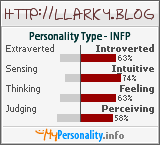"An instructive version of this problem occurred in a girl of
twenty whose complaint was of being 'self-conscious' because she
had an ugly face. To her face she applied white powder and bright
red lipstick, giving it, if not an ugly appearance, at least a startlingly
unpleasant, clownish, mask-like expression, which decidedly
did not exhibit to advantage the features she had. In her mind, she
did this to cover up how ugly she was underneath her heavy makeup.
On further examination it became evident that this girl's attitude
to her face contained in nuclear form the central issue of her
life: her relationship with her mother.
She was much addicted to scrutinizing her face in the mirror.
One day it came to her mind how hateful she looked. It had been in
the back of her mind for years that she had her mother's face.
The word 'hateful' was pregnant with ambiguous meanings. She hated
the face she saw in the mirror (her mother's). She saw, too, how
full of hate for her was the face that looked back at her from the
mirror; she, who was looking at the mirror, was identified with her
mother. She was in this respect her mother seeing the hate in her
daughter's face: that is, with her mother's eyes, she saw her hate
for her mother in the face in the mirror, and looked, with hatred,
at her mother's hatred of herself.
Her relationship with her mother was of over-protection on her
mother's part, and over-dependence and compliance on her part.
She could not tolerate the possibility, in reality, of hating her
mother, nor could she allow herself to recognize the presence of
hatred for herself in her mother. All that could not find direct expression
and open acknowledgement in her was condensed in her
presenting symptom. The central implication seemed to be that
she saw her true face to be hateful (full of hate). She hated it for
being so like her mother's. She was frightened of what she saw. In
covering up her face she both disguised her own hatred and made
a surrogate attack upon her mother's face. A similar principle
operated throughout the rest of her life. In her, the child's normal
obligingness and obedience not only turned into passive acquiescence
in every wish of her mother, but became the complete effacement
of herself and went on to become a parody of anything her
mother consciously could have desired of her daughter. She turned
her compliance into an attack, and exhibited for all to see this
travesty of her true self, which was both a grotesque caricature of
her mother and a mocking 'ugly' version of her own obedience.
Thus, the hatred of the other person is focused on the features of
him which the individual has built into his own being, and yet at
the same time the temporary or prolonged assumption of another's
personality is a way of not being oneself which seems to offer
security. Under the mantle of someone else's personality the person
may act so much more competently, smoothly, 'reliably' - to
use Mrs D.'s expression, the individual may prefer to pay the price
of incurring the haunting sense of futility which is the necessary
accompaniment of not being oneself, rather than hazard the
frank experience of frightened helplessness and bewilderment
which would be the inevitable start to being oneself. The false-self
system tends to become more and more dead. In some people, it is
as though they have turned their lives over to a robot which has
made itself (apparently) indispensable."
- LAING
domingo, 1 de noviembre de 2009
Suscribirse a:
Enviar comentarios (Atom)

No hay comentarios:
Publicar un comentario